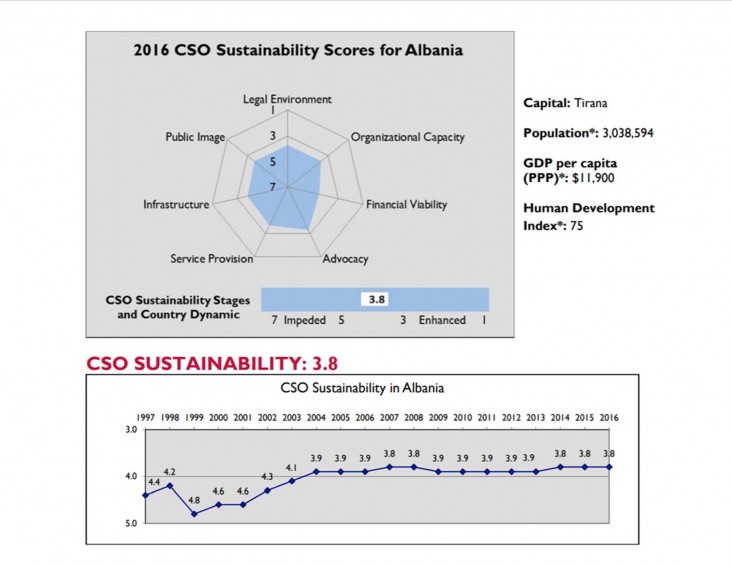Speeches Shim

CURRENT PROJECTS
- Accelerated Civic Development And Cooperation: January 2017-July 2020
- Justice for All: March 2016-March 2021
- Planning and Local Governance Project: January 2012-September 2019
- Sustainable Water Sector Capacity Development: August 2014-March 2019
- Economic Empowerment of People with Disabilities: September 2010-November 2019
- People First: September 2016- October 2018
The involvement of CSOs in Albania’s EU accession process is essential. CSOs participate in the process by actively engaging in the preparation and implementation of EU projects, as well as awareness raising, capacity building, and advocacy campaigns on major national reforms related to good governance and social development.
Steps were taken in 2016 to establish the National Council for Civil Society (NCCS), an advisory body to the government on civil society issues that is expected to provide a framework for more structured government consultations with CSOs. Elections were held for the thirteen CSO representatives, and in June 2016, the NCCS held its first informational meeting. However, the council was not officially constituted by the end of 2016. Although the legal environment governing the sector improved in 2016, overall CSO sustainability remained stagnant. CSOs continue to make efforts to improve their strategic planning, constituency and coalition building, advocacy, and use of modern technologies; however, these initiatives were insufficient to make significant and sustainable changes to the CSO environment in Albania. Data on the size of the civil society sector is still not publicly available. There are around 12,000 CSOs— including associations, foundations, and centers— registered in the Tirana Court of First Instance. However, the total number of active CSOs registered with the tax authorities is just 3,724.
While civil society development is a cross‐cutting issue of USAID/Albania programs, in 2017 USAID began a standalone activity focused on civil society development. Currently, USAID/Albania supports with financial, technical, or a combination of both approximately 80 organizations.
PROGRAM AREAS
CAPACITY BUILDING OF CSOS
USAID’s civil society program seeks to build and strengthen participative democracy in Albania, as well as stimulating a civil society-friendly environment and culture. USAID is providing assistance to organizations working in the democracy and governance sector, including CSOs and governmental bodies to strengthen their capacities and accountability, as well as increase their capacity to foster and sustain democratic processes. USAID will award grants to local organizations, to target selected areas, including (but not limited to) election oversight, women’s empowerment, marginalized population rights, anti-corruption, and increased citizen oversight and/or provide practical experience for the capacity building training they will receive.
ANTICORRUPTION AND JUDICIAL REFORM
One of the objectives of USAID’s justice sector program is to promote stronger and more effective civic participation in justice sector reforms and anticorruption efforts. The project works with organizations, human rights and democracy NGOs, and media organizations and journalists to increase public awareness, monitor government policies and decisions, and investigate and report on corruption cases.
GOOD GOVERNANCE AND PLANNING
USAID’s planning and local governance program aims to strengthen the involvement of local civil society groups, businesses, and citizens in local government processes. This is done, for example, by including the civic and private sectors in Citizen Advisory Panels, establishing participatory budgeting mechanisms, and creating local government outreach mechanisms.
VULNERABLE POPULATIONS
Since 2000, USAID has supported civil society organizations working with victims of trafficking and domestic violence, as well as persons with disabilities and LGBT. Current activities seek to strengthen the long-term sustainability of CSOs to advocate for government policies to better support the needs of vulnerable populations and increased economic opportunities.
ENTREPRENUERSHIP AND EMPLOYMENT
In order to improve the competitiveness of Albanian private enterprises, USAID is working with trade and business associations to resolve industry-wide issues that impede enterprise growth, innovation, and development.

Comment
Make a general inquiry or suggest an improvement.